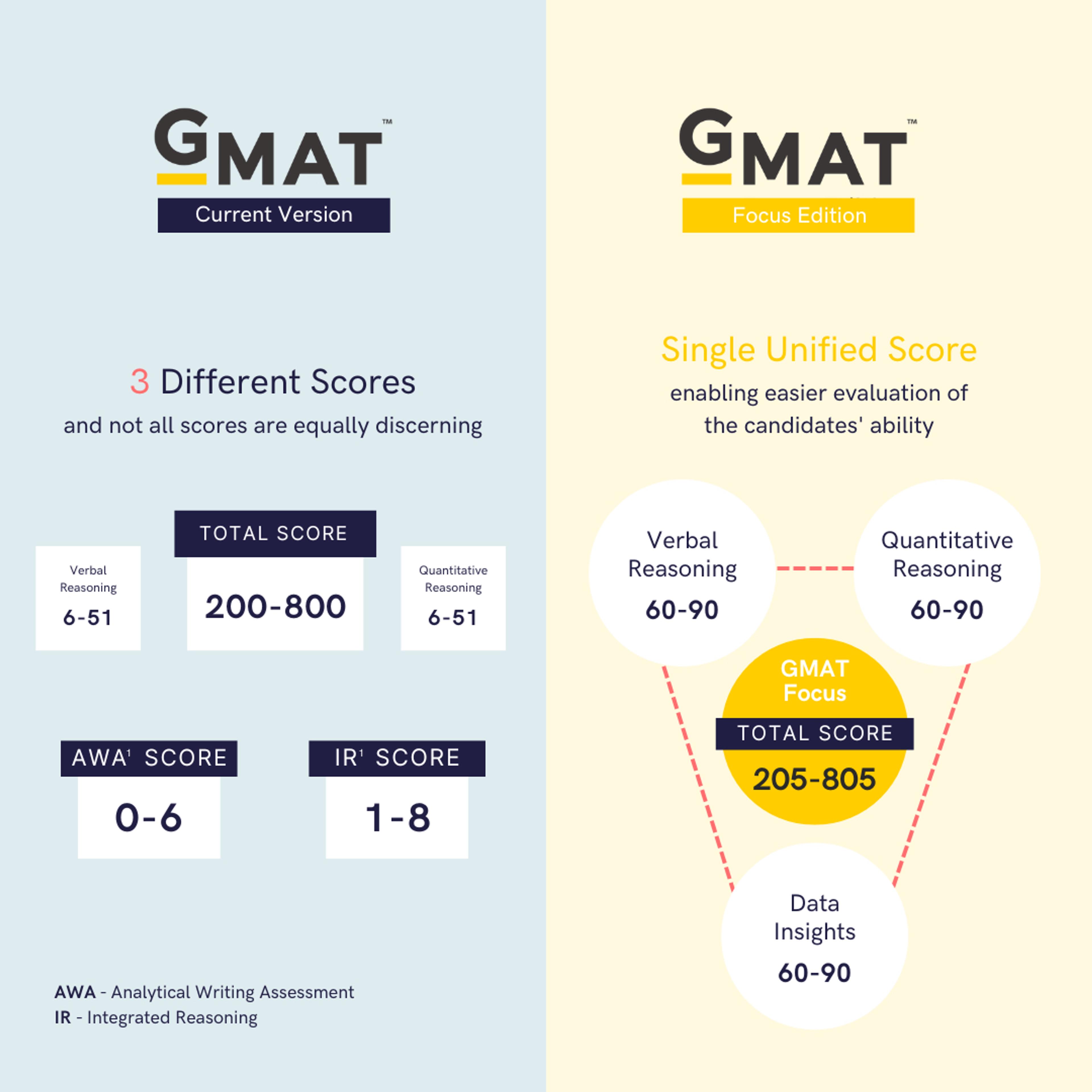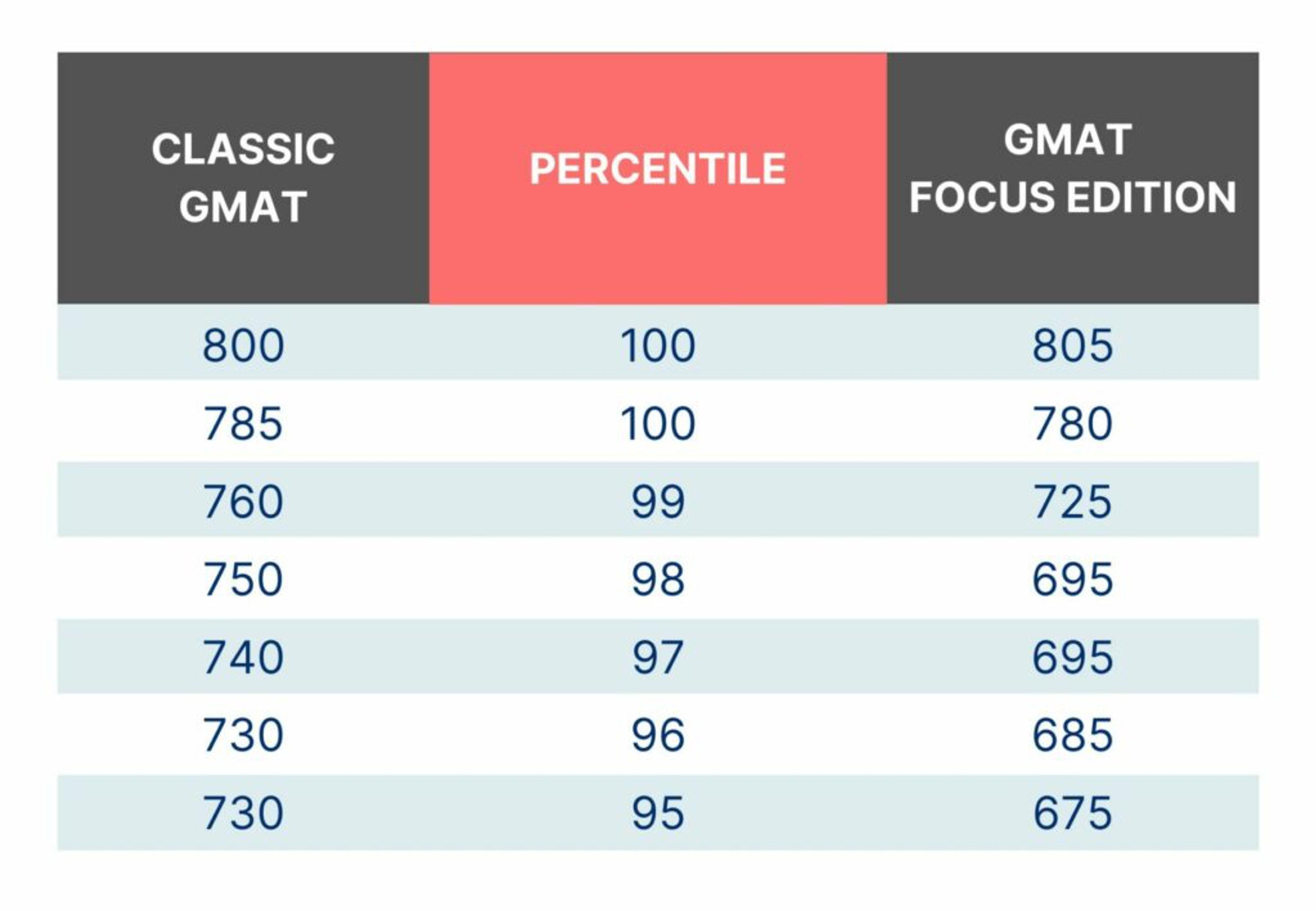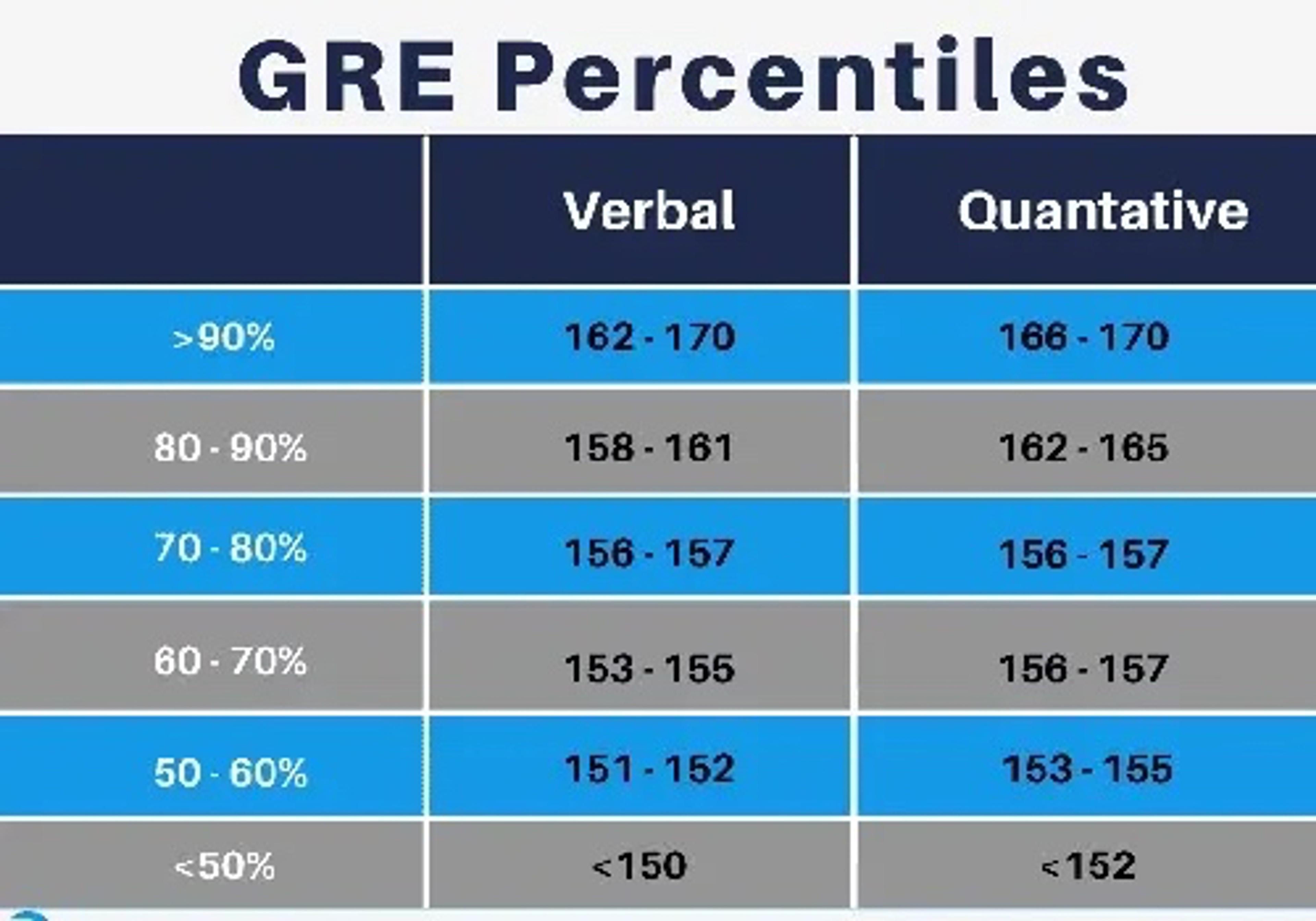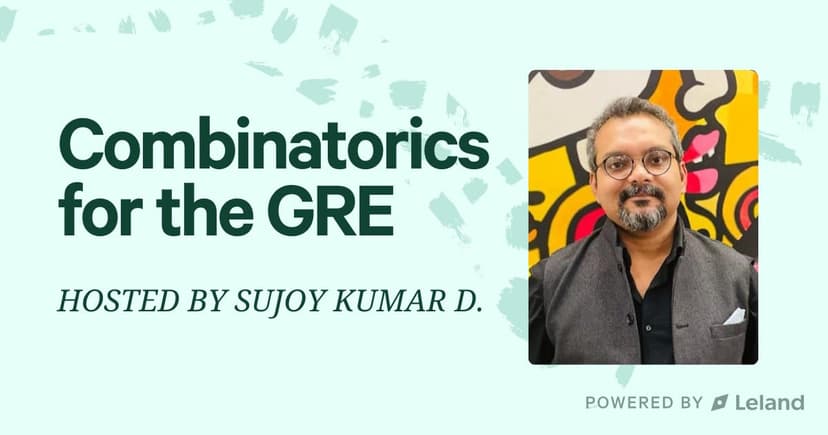GMAT vs. GRE for an MBA—Which Should You Take (and How to Ace Both)
Applying to top MBA programs? Click here to determine if the GMAT or GRE is better for you—along with tips and tricks to ace both tests. Includes a comprehensive overview of both tests (the GMAT Focus and new, shorter GRE), test tips, section breakdowns, and more.
Posted June 16, 2025

Join a free event
Learn from top coaches and industry experts in live, interactive sessions you can join for free.
Table of Contents
GMAT vs. GRE: Overview
When applying for top MBA programs such as Harvard Business School or the Stanford Graduate School of Business, you’ll need to take the GMAT (Graduate Management Admission Test) or GRE (Graduate Record Examination). The GMAC (Graduate Management Admission Council) administers the former while the latter is administered by the ETS (Educational Testing Service).
These are tough tests, but with the right prep and coaching, they can be conquered. In this article, we’ll cover everything you need to know about these two tests: what each entails, the primary differences, which one is best for you, and more, to make sure you’re going in as prepared as possible.
And if you're just starting out on your MBA application journey, be sure to check out The Ultimate MBA Application Guide for expert tips and insights to help you navigate the graduate business school admissions process with confidence.
Now let’s dive in — we’ll start with general info about each exam. Note that both the GRE and GMAT were recently overhauled and the new versions of the tests are much shorter and more focused. If you are yet to take the test, this is good news. Below, we’ll cover what the new exams entail, as well as what has changed.
GMAT vs. GRE: The Basics
The GMAT and GRE are two of the most widely recognized standardized tests for graduate programs, particularly for business school. The GMAT exam, again administered by the Graduate Management Admission Council, has long been the preferred test for business schools, while the GRE, administered by the Educational Testing Service, is accepted by a broader range of graduate programs, including business schools (and more recently, law schools).
Historically, the GMAT was developed specifically for business school admissions in the 1950s and has since evolved to assess a candidate's analytical, verbal, quantitative, and integrated reasoning skills. The GRE, on the other hand, was first introduced in 1936 as a general test for a wide variety of graduate programs. In recent years, with changes in test content and format, both exams have become shorter and more focused, making them more accessible to a broader range of applicants. Most business schools now accept the GRE, and applicants have gained the flexibility to choose the test that aligns better with their strengths and career goals.
Note: For executive MBA applicants, there is an alternative option to the GMAT/GRE, the Executive Assessment (EA). The EA, also designed by GMAC, is tailored specifically for experienced professionals seeking executive-level education. Unlike the GRE and GMAT, the EA is shorter, taking only 90 minutes, and focuses on evaluating skills that are essential for executive-level management, such as critical thinking, problem-solving, and data analysis. It is also less rigorous in terms of preparation, making it a more convenient choice for busy professionals who want to demonstrate their readiness for an executive MBA without the extensive preparation required by the GMAT or GRE. Additionally, the EA is widely accepted by top executive MBA programs, making it a viable alternative for those with significant professional experience.
| GRE (Shorter Version as of Sep. 2023) | GMAT (Focus Edition) | |
|---|---|---|
| Total Length | 1 hour 58 minutes | 2 hour 15 minutes |
| Sections | 5 Total: 1 Analytical Writing; 2 Verbal Reasoning; 2 Quantitative Reasoning | 3 Total: Verbal Reasoning; Quantitative Reasoning; Data Insights |
| Verbal Reasoning | 41 minutes | 45 minutes |
| Quantitative Reasoning | 47 minutes | 45 minutes |
| Other Section | Analytical Writing: 30 min. | Data Insights: 45 min. |
| Cost | $220 (for the US) | $275 (Test Center); $300 (Online) |
| # of Questions | Verbal: 27; Quantitative: 27; Writing: 1 | Verbal: 23; Quantitative: 21; Data: 20 |
| Calculator Allowed | Yes | No |
| Test Frequency | 1x every 21 days; 5x in a rolling 12-month period | 5x in a rolling 12-month period |
| Reviewing Answers | Can move back and forth and change answers | Can move back and forth and change the answers to 3 questions |
Key Differences in the New GMAT & GRE
GMAT vs. GMAT Focus Edition: What Changed?
- It's now a much shorter test, by almost an hour
- The AWA (writing) section has been removed
- The Quant section will no longer include geometry or data sufficiency questions
- There is a new Data Insights section that is similar to the old Integrated Reasoning section; it will include questions on integrated reasoning and data sufficiency.
- The Verbal section will no longer include sentence correction questions
- The composite score is now on a scale from 205-805 (so it's easier to tell if someone has taken the old or new GMAT)
- The Quant, Verbal, and Data Insights sections are graded on a scale from 60-90
- You can change your answers to up to three questions per section
- The test now includes a better Enhanced Score Report for free
See more on the official site here.
Old GRE vs. New GRE: What Changed?
- Also much shorter than before, roughly half the time
- The "Analyze an Argument" part of the writing section has been removed
- There are fewer questions total in both the quantitative and verbal sections
- The unscored/research section has been removed
- Official scores will arrive much faster, between 8-10 days
See more on the official site here.
GMAT vs. GRE: Scoring
Now that we’ve covered the basics, let’s talk about how both tests are scored.
GMAT: Focus Edition Scoring
- Total GMAT scores for the GMAT: Focus Edition range from 205 to 805 in 10-point increments. To distinguish them from scores of the older-edition GMAT exams, GMAT Focus Edition scores now end in a 5.
- Two-thirds of test-takers score between 400 and 600.
- The Total Score now incorporates all three sections: Quantitative, Verbal, and Data Insights. Each section score ranges from 60 to 90, all in 1-point intervals.
- Note: there is a penalty for not completing each section of the exam. If you do not finish a section in the allotted time, your scores will be calculated based on the number of questions you answered. Your GMAT score will decrease significantly with each unanswered question.
- Once you complete the exam, you’ll immediately be able to see your unofficial scores, which will contain four numbers: your Quantitative, Verbal, and Integrated Reasoning Scores, as well as your overall score (based on your Quantitative and Verbal sections).
- You’ll receive your Official Scores about 3-5 days after taking your exam.
- Within 48 hours of receiving your Official Score Report, you may send your scores to up to 5 schools for free; you will pay a small fee for each school above 5.
- Note: you can reinstate your scores by logging into your MBA.com account; you can reinstate up to 4 years and 11 months after your exam date, and reinstatement costs $50.
- Test results are valid for 5 years.

GRE: Scoring
- The GRE exam is scored based on the Verbal and Quantitative sections. Scores range from 130 to 170 in 1-point increments.
- The Analytical Writing Section is measured from 0 to 6, in half-point increments.
- You can access your official GRE scores in your ETS account 8-10 days after your test date. You will be notified by email by ETS when your scores are available online.
- After reviewing your scores, you can select the schools to which you’d like to report your scores. You can select up to 4 schools for free. Any schools over 4 and ETS will charge a small fee.
- GRE test results are valid for up to 5 years.
Test Percentiles
Understanding the percentile rankings for these two tests is crucial for interpreting your scores in the context of the broader applicant pool. Percentiles indicate how your performance compares to that of other test-takers, giving you a clearer picture of your competitiveness. For instance, if you score in the 90th percentile, it means you performed better than 90% of everyone else who took the test. On the GMAT, a score of 730 typically places you in the 96th percentile, making you highly competitive for top MBA programs. On the GRE, a combined Verbal and Quant score of 330 usually corresponds to the 98th percentile, positioning you well for admission to a wide range of graduate programs, including business schools.
It's important to note that percentile rankings can vary slightly each year based on the performance of the current test-taking cohort. This variability underscores the importance of staying informed about the latest percentile data, especially if you're aiming for highly selective programs. Additionally, schools often consider not just your total score but also how you performed in specific sections relative to other applicants. For example, a strong Quant score in the 80th percentile on the GRE might be essential for admission to a business analytics or finance program, even if your overall score is lower.
Read: 10 Best GRE Tutors
GMAT Percentiles

GRE Percentiles

Get Personalized Help With Your GMAT/GRE Prep
Looking for help on the GMAT or GRE? We have 750+ experts on Leland to help you out! Here are some of our most popular GRE and GMAT coaches. For help on your business school application, head here.
GMAT vs. GRE: Sections & Structure
GMAT: Verbal, Quant, & Data Insights
Verbal
- The Verbal Reasoning section of the GMAT exam measures your reading comprehension, argument evaluation, and clarity of communication. It consists of 23 multiple-choice questions, and you will have 45 minutes to complete it.
- The Verbal section contains two types of problems: Reading Comprehension and Critical Reasoning.
- Reading Comprehension questions measure your skill in understanding words and statements, understanding logical relationships between significant points, drawing inferences, and following the development of quantitative concepts. Specifically, you will be tested on the following: main idea, supporting idea, inference, application, logical structure, and style.
- Critical Reasoning measures your ability to make and evaluate arguments, then formulate or evaluate a plan of action; these questions are based on a short reading passage of 100 words or fewer.
Quant
- The Quant section measures your mathematical reasoning, ability to solve complex problems, and interpretation of graphic data. It has 21 multiple-choice questions. You will be given 45 minutes to complete it.
- The Quantitative Section is composed of a series of problem-solving questions that require some knowledge of arithmetic and elementary algebra. The real difficulty of the questions stems from the logical and analytical skills required and the time limit, not the underlying math skills. Note that you’re not allowed a calculator in this section.
- Remember to take advantage of the whiteboard the test provides you with to avoid errors. For specific guidelines on the whiteboard, read here.
Data Insights
- The Data Insights section measures candidates' ability to analyze and interpret data and apply it to real-world business scenarios, as well as digital and data literacy.
- You’ll have 45 minutes to work through 20 questions that assess how multiple sources and types of information (graphic, numeric, and verbal) relate to one another and can be leveraged for decision-making.
- There are 5 different question types for the Data Insights Section:
- Data Sufficiency: Requires analyzing a quantitative problem, recognizing relevant data, and determining whether there is enough information to solve the problem.
- Multi-Source Reasoning: Involves examining data from multiple sources (text passages, tables, graphics) to answer questions, recognizing discrepancies, drawing inferences, and determining data relevance.
- Table Analysis: Tests the ability to sort and analyze table data to identify relevant information or meet specific conditions.
- Graphics Interpretation: Evaluates the interpretation of information presented in graphical formats such as charts, graphs, and statistical distributions.
- Two-Part Analysis: Requires solving complex problems, which can be quantitative, verbal, or a combination of both, evaluating trade-offs, solving simultaneous equations, and discerning relationships between entities.
GRE: Verbal, Quant, and Analytical Writing Assessment (AWA)
Verbal
- The GRE Verbal Reasoning section measures your ability to analyze and draw conclusions from arguments, reason using incomplete data, identify authors’ assumptions and perspectives, and understand different levels of meaning (literal, figurative, etc.).
- In this section, you’ll also select important points in the text, distinguish major from minor or irrelevant points, summarize text, and be asked to comprehend the structure of a text.
- The Verbal section also tests your understanding of the meaning of individual words, sentences, and an entire text, as well as your understanding of relationships among words and among concepts. Vocabulary and grammar skills are very important here.
- The Verbal section is scored from 130 to 170, in 1-point increments.
Quant
- The Quantitative Reasoning section of the GRE assesses your skills in basic mathematics, understanding of elementary mathematical concepts, and ability to reason quantitatively and solve problems using quantitative methods.
- Some Quant questions are posed in real-life settings, while others are posed in purely mathematical settings. Many of the questions are word problems.
- There are four different types of problems: arithmetic, algebra, geometry, and data analysis.
- The GRE Quant section only includes math and statistics at the high school level; you won’t see problems higher than the level of Algebra II. You will not encounter trigonometry, calculus, or other high-level mathematics.
- Important things to remember:
- You’ll only see real numbers in your problems.
- Assume that all figures lie in a plane unless otherwise stated.
- On questions with geometric figures, your answers should be based on geometric reasoning, not on sight estimation.
- For problems involving coordinate systems and graphical data presentations, figures are drawn to scale, so you can read, estimate, or compare quantities by sight or by measurement.
- You are allowed to use a basic calculator for this part of the exam. If you are in a testing center, you’ll have an electronic calculator on the screen.
Read: Calculators on the GMAT/GRE: When You Can Use Them
Analytical Writing
- The writing section of the GRE will assess your critical thinking skills by testing your ability to articulate complex ideas, construct arguments, and sustain a focused and coherent discussion. It does not test specific content knowledge.
- This section comprises a task called “Analyze an Issue,” during which you will be presented with an opinion on an issue and given instructions on how to respond.
- The basic structure for the “Analyze the Issue” task includes evaluating the problem, considering its complexities, and developing an argument supported by reasons and examples.
- You will be given 30 minutes to complete this section.
- Test-takers use a basic word processor developed by ETS to type their essay responses. The word processor includes functions such as inserting, deleting, cutting, and pasting text, as well as undoing the previous action. However, tools like spell checkers and grammar checkers are not available.
- The GRE Program has published the entire pool of tasks from which test tasks are selected to help candidates prepare for the writing part. You can find it here.
GMAT vs. GRE: Which is Harder?
One question we hear all the time is: which test is harder, the GMAT or the GRE? This depends on your strengths as a test-taker and your quantitative and verbal skills, but let’s look at each section in turn.
Verbal
Content and Focus:
- The GRE verbal section focuses heavily on vocabulary and reading comprehension. It includes questions on text completion and sentence equivalence that require a strong command of vocabulary to select the correct words or phrases that best complete a sentence.
- The GMAT verbal section focuses on grammar, logical reasoning, and reading comprehension. It includes sentence correction questions, which require an understanding of proper grammatical construction, and critical reasoning questions, which test the ability to evaluate arguments and formulate or evaluate a plan of action.
Question Types:
- GRE: The verbal section is more vocabulary-centric, with a large portion of questions testing the ability to understand and apply vocabulary in context.
- GMAT: The verbal section includes a broader range of question types, including critical reasoning and more complex sentence correction questions.
Test Format:
- The GRE allows you to move back and forth between questions within a section, potentially making it easier to manage time and revisit tougher questions.
- The GMAT is a computer-adaptive test on a question-by-question basis in the verbal section, meaning the difficulty of the test adjusts depending on your answers as you progress. This can make it feel more challenging since each question depends on the accuracy of previous answers.
The GMAT Verbal Section might be easier for you if...
- You excel in logical reasoning and critical thinking. The GMAT focuses heavily on evaluating arguments and logical structure.
- You have strong grammatical skills. The sentence correction questions require a good understanding of English grammar and sentence structure.
- You prefer dealing with structure and argument-based questions over extensive vocabulary tests. The GMAT's verbal section emphasizes understanding and critiquing arguments more than memorizing vocabulary.
- You are good at managing one question at a time under pressure. The GMAT is adaptive by question, making it crucial to focus on each question as it comes.
- You have practiced handling the specific formats of GMAT verbal questions, such as critical reasoning and sentence correction, which have unique formats not found on the GRE.
The GRE Verbal Section might be easier for you if...
- You have a strong vocabulary. The GRE's verbal section heavily tests vocabulary knowledge through text completion and sentence equivalence questions.
- You are good at quickly understanding and analyzing written passages. Reading comprehension questions form a significant part of the GRE verbal section.
- You prefer a test format that allows you to review and change answers within a section. Unlike the GMAT, the GRE lets you skip and return to a previous question, and change your answers to questions within a section.
- You excel at filling in blanks with appropriate words based on sentence context. This is a key skill for the text completion and sentence equivalence parts of the GRE.
- You enjoy and are proficient at deciphering complex sentence structures to find subtle meaning differences. This skill is particularly valuable for excelling in the GRE verbal section.
Quant
Content and Focus:
- The GRE Quant section assesses basic mathematical skills, elementary mathematical concepts, and the ability to reason quantitatively. It includes questions that require problem-solving and quantitative methods to model and solve various types of problems.
- The GMAT Quant section evaluates mathematical ability, numerical literacy, and the capacity to reason, solve problems, and interpret data. It measures skills applicable in quantitative-based subjects like finance, accounting, and managerial statistics. This section comprises Problem-Solving questions that test common knowledge of concepts in arithmetic, elementary algebra, and word problems.
Question Types:
- GRE: The Quant section features a variety of question types, including Quantitative Comparison, Multiple-choice (Select One Answer Choice), Multiple-choice (Select One or More Answer Choices), and Numeric Entry questions. Additionally, questions may appear independently or as part of Data Interpretation sets.
- GMAT: The Quant section consists mainly of Problem-Solving questions, which cover arithmetic, algebra, and word problems, evaluating the ability to apply mathematical concepts and reasoning skills to solve numerical challenges.
Test Format:
- The GRE allows flexibility in navigating between questions within a section, enabling candidates to manage time effectively and revisit challenging items.
- The GMAT incorporates computer-adaptive test questions in the Quant section, tailoring the difficulty of subsequent questions based on the accuracy of previous responses. This adaptive format can increase the perceived challenge level as the test progresses.
The GMAT Quant Section might be easier for you if…
- You are comfortable with data sufficiency problems. The GMAT exam is unique in its emphasis on data sufficiency, where you need to determine if given information is enough to solve a problem.
- You have strong logical reasoning skills. This section tests not only your math skills but also your ability to reason effectively and make strategic decisions under pressure.
- You excel in problem-solving using algebra, geometry, and arithmetic. While both tests cover these areas, the GMAT focuses on applying these in complex problem-solving scenarios.
- You can handle adaptive question difficulty. The GMAT adjusts the difficulty of each question based on your previous answers, which can be a benefit if you are consistently answering correctly, as it allows you to demonstrate a higher level of ability.
- You prefer a structured approach to tackling one question at a time. The adaptive nature of the GMAT means each question depends on the last, focusing you on the current problem without the ability to return to previous questions.
The GRE Quant Section might be easier for you if…
- You are good at quantitative problems, particularly comparisons. A significant portion of the GRE quant involves comparing two quantities and determining the relationship between them.
- You prefer a mix of problem styles. The GRE includes not only problem-solving but also data interpretation and quantitative comparison, which may suit those who can switch between different types of mathematical thinking.
- You have a solid understanding of basic math and statistics. The GRE tests a wide range of mathematical topics, including more straightforward calculation and interpretation problems.
- You like being able to review and change your answers. Unlike the GMAT, the GRE allows you to skip questions and return to them within a section, which can help manage time and stress by tackling easier questions first.
- You perform well in a section-level adaptive test. The GRE adapts the difficulty of the second section based on your performance in the first, which might be less pressure than adapting after every question, as in the GMAT.
Analytical Writing
Previously, both the GRE and GMAT had writing sections, but as of the latest updates, only the GRE includes this component. In the GRE, the AWA evaluates your ability to articulate complex ideas, construct arguments, and sustain coherent discussions within a 30-minute "Analyze an Issue" task. If you feel confident in your writing ability, you should definitely consider taking the GRE.
GMAT vs. GRE: Which Should I Take?
Okay, now the big question — which exam should you take?
The best piece of advice we can give is to consider your strengths. We’ll get into specifics below, but know which exam favors which skill set/knowledge base, and choose accordingly. Many people feel pressure to take the GMAT because it’s the exam traditionally associated with business school; but, if you’re better suited for the GRE, then take it. Don’t let pride get in the way of scoring well!
Here are some other things to consider:
- For almost every MBA program in the U.S., both tests are accepted equally. Schools used to have a preference for the GMAT, but that is no longer the case. Note that some international schools do still have a stated preference for the GMAT, so be sure to check on the preferences of any international programs you’re applying to.
- Both are computer-adaptive tests. The GMAT is question-adaptive and will get harder based on each question you answer, while the GRE is section-adaptive, and will only get harder based on how you perform on each section.
- At the end of each section, the GMAT has a “Question Review & Edit” feature which allows you to review as many questions as you want and edit up to three of your answers. The GRE, meanwhile, allows you to move back and forth within each section at your own will during each time block.
As the above shows, which test you should take is a complicated question. Most people will tell you that if you’re more verbally inclined and less confident in your quantitative skills, you should take the GRE. If you’re stronger quantitatively, take the GMAT.
Here’s our recommendation: take a practice test for both. See how you feel in each – which one seems better paced? Which do you score better on? Which one has better-timed breaks? Many of these subtle differences can make a big difference in your overall performance, and the best way to figure them out is to take a practice test.
And don’t forget — our world-class GMAT/GRE coaches are here to help.
Read: Two Proven Techniques to Supercharge Your GMAT & GRE Study Sessions
What’s the best way to prepare for the GMAT/GRE?
Okay — we’ve covered each test, talked about the way they’re scored, and how to make the best decision as to which test to take. Now, you’re looking for a recommendation on how to tackle the exam. We’ve got you covered.
- First, as we said above, take two practice exams — one GMAT, and one GRE. You can find free Graduate Management Admission Test practice exams at Princeton Review, Kaplan, and Manhattan Prep. You’ll find free GRE practice exams on the official site, ETS.
- Second, once you’ve seen your practice scores, you’ll be better able to determine which test is better for you. From there, we strongly recommend you find a GMAT / GRE coach. Going through this process alone is very difficult. See above for some of our coach recommendations; browse Leland’s cohort of GMAT Coaches & GRE Coaches.
- Third, put together a robust study plan. Give yourself at least six months to prepare and take the exam, knowing that you may need to take it multiple times to get the score you want. For the best results, we recommend pairing a personal coach with free exam and practice questions resources found on the web. Here are some of our favorites:
- Fourth, don’t give up! We know it’s tough when you keep grinding and aren’t seeing the results you’re looking for, but with the right help, you can hit your target number. Still looking for a personalized GMAT / GRE study plan or coach recommendation? Check out our 800+ experts here.
FAQs on the GMAT vs. GRE for MBA
Which admissions test, the GMAT or GRE, is more commonly accepted by business schools?
- Both the GMAT and GRE exams are widely accepted by business schools for MBA admissions. However, historically, the GMAT exam has been the preferred choice. Nonetheless, many schools now accept both exams, allowing applicants to choose the standardized test that best suits their strengths.
How do GMAT scores compare to GRE scores?
- A GMAT score (Focus edition) ranges from 205 to 805, with the average score typically falling around 545. On the other hand, GRE scores range from 130 to 170 for both the verbal and quantitative sections, with an average score around 150 for each section. The writing section for the GRE, meanwhile, has an average test score of 3.5. It's essential to check with individual schools to determine their score expectations.
How many essays do I need to write for each test?
- The AWA section on the GRE requires an analysis and evaluation of only one topic/argument. The new Focus Edition of the GMAT, however, has removed its essay writing element from previous years.
How long are GMAT and GRE test scores valid for?
- Both GMAT and GRE scores are valid for five years. It's important to note that individual schools may have their own policies regarding the expiration of test scores, so applicants should verify the requirements of their target institutions.
Can I retake the GMAT or GRE if I am dissatisfied with my initial test score?
- Yes, both the GRE and GMAT allow you to retake the exam if you are unhappy with your initial test score. However, there are restrictions on how frequently you can retake the test. For the GMAT, you can take the exam up to five times within a rolling 12-month period, while the GRE allows you to retake the test every 21 days, up to five times within a 12-month period.
Can I get a test waiver for the GMAT or GRE when applying to business school?
- Yes, some business schools offer test waivers, especially for candidates with strong professional experience, advanced degrees, or exceptional academic records. Waiver policies vary by school, so it's important to check the specific requirements of each program you're applying to. If you believe you qualify, you typically need to submit a waiver request and provide supporting documentation.
How do I access test prep materials for the GMAT and GRE?
- There are numerous prep materials available for both the GMAT and GRE, including books, online courses, practice exams, and tutoring services, many of which we host here on Leland. Always make sure to explore different options to find the test resources that work best for you.
What is the best test for different graduate schools?
- Most graduate programs require a test for admission. In recent years, schools have accepted a broader range of tests. Here is the program and the most commonly taken exam:
- MBA Programs: GMAT or GRE
- Executive MBA Programs: Executive Assessment (EA) or GMAT
- Law Schools: LSAT (Law School Admission Test)
- Medical Schools: MCAT (Medical College Admission Test)
- Graduate Programs in the Arts & Sciences: GRE (Graduate Record Examination)
- Engineering and Technology Programs: GRE or specific subject tests like the GRE Subject Test in Mathematics or Physics
- Business Analytics/Finance Programs: GRE or GMAT
- Public Policy/Public Administration Programs: GRE
- Pharmacy Programs: PCAT (Pharmacy College Admission Test)
- Education Programs: GRE or MAT (Miller Analogies Test)
- Dental Schools: DAT (Dental Admission Test)
- Whatever graduate degree you are trying to get, make sure to give yourself adequate time to prep and, if you have options, take the requisite time to figure out what the right test is for you. Most applicants are surprised by how much time it takes.
Read Next:
Browse hundreds of expert coaches
Leland coaches have helped thousands of people achieve their goals. A dedicated mentor can make all the difference.



















